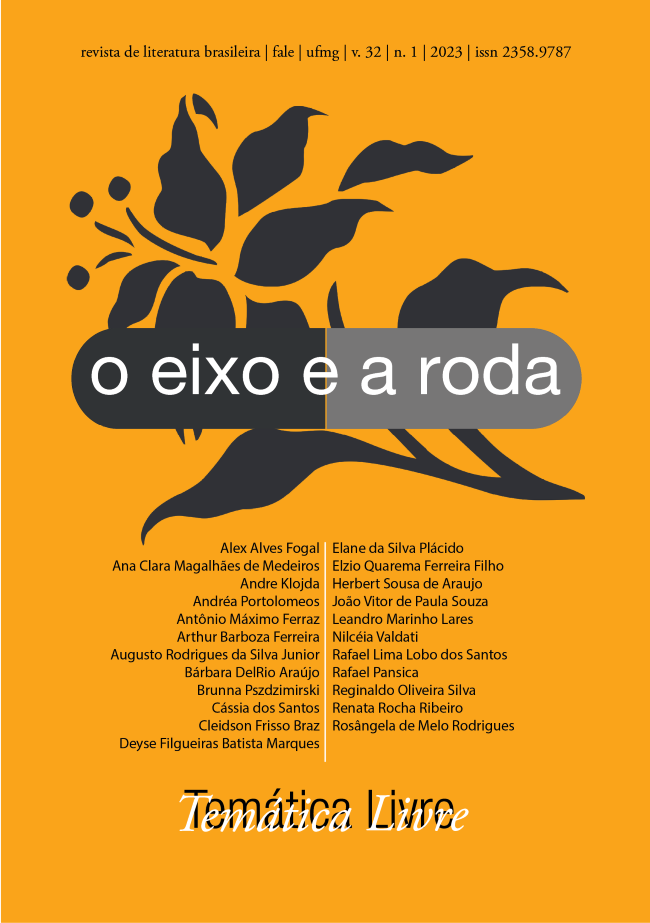The aporia of trauma and the writing of resistance
the past that doesn’t pass in O corpo interminável, by Claudia Lage
DOI:
https://doi.org/10.17851/2358-9787.32.1.295-320Keywords:
resistance narrative, trauma writing, memory, Brazilian military dictatorship, O corpo interminávelAbstract
This work is the result of the need to reflect on fictional narrative paths and resistance in the face of historical trauma and forgetfulness related to the military dictatorship in Brazil. This appreciation has as sample the work O corpo interminável (2019), by Claudia Lage, whose characters are inserted in the scope of barbarism and state violence. In an attempt to reach experiences that were extorted by political authoritarianism, the novel presents the search for lives and histories silenced due to the years of barbarism imposed by the Brazilian military dictatorship. Alternating narrative voices and historical times, the notion of a past that is still present and that, immersed in secrecy and oblivion, remains marked by absences, voids, inaccuracies, gaps, and fractured memories. We propose the mobilization of fictional narrative as an instrument of reconstruction of the debris of this past, in the struggle to prevent the same violations from being repeated in the present. The intention of this reading is to contribute to the political and aesthetic characterization of the novel, because, by exploring the narrative strategies in O corpo interminável, it is hoped to discuss the relevance and essentiality of contemporary Brazilian literature in the process of recovering a dark past. As a theoretical-critical basis, the considerations of Dalcastagnè (2017), Figueiredo (2017), Ginzburg (2000 and 2017), Seligmann-Silva (2003, 2008 and 2016), among others, will be used.
Downloads
References
DALCASTAGNÈ, R. Literatura e resistência no Brasil hoje. Revista Communitas, Vol. 1, n. 2, (Jul-Dez), 2017: Relações de poder e formas de resistências na educação e na literatura. Disponível em: https://periodicos.ufac.br/index.php/COMMUNITAS/article/view/1504/874. Acesso em: 27 ago. 2022.
FIGUEIREDO, E. A literatura como arquivo da ditadura brasileira. 1. ed. Rio de Janeiro: 7 Letras, 2017.
GAGNEBIN, J. M. Lembrar escrever esquecer. 2 ed. São Paulo: Editora 34, 2009.
GINZBURG, J. Autoritarismo e Literatura: a História como Trauma. Revista Eletrônica Vidya. Universidade Franciscana, v. 19, n. 33, 2000, p. 43-52.
GINZBURG, J. Crítica em tempos de Violência. 2. ed. São Paulo: Editora da Universidade de São Paulo, Fapesp, 2017.
GINZBURG, J. O narrador na literatura brasileira contemporânea. Tintas. Quaderni di letterature iberiche e iberoamericane, v. 2, p. 199-221, 2012. Disponível em: http://riviste.unimi.it/index.php/tintas/article/view/2790/2999. Acesso em: 25 ago. 2022.
GOMES, G. M. Narrativas brasileiras contemporâneas: memórias da repressão. Porto Alegre: Polifonia, 2020.
LAGE, C. As lacunas na história: é delirante pedir a volta da ditadura militar, diz autora que escreveu sobre o período. Entrevista concedida a Paula Carvalho. Quatro, Cinco, Um: a revista dos livros, 20 jul. 2020. Disponível em: https://www.quatrocincoum.com.br/br/noticias/l/as-lacunas-na-historia. Acesso em: 24 ago. 2022.
LAGE, C. O corpo interminável. Rio de Janeiro: Editora Record, 2019.
LEVI, P. Os afogados e os sobreviventes: os delitos, os castigos, as penas, as impunidades. 5 ed. Rio de Janeiro: Paz e Terra, 2022.
NESTROVSKI, A.; SELIGMANN-SILVA, M. Catástrofe e representação: ensaios. São Paulo: Escuta, 2000.
SELIGMANN-SILVA, M. História, memória, literatura: o testemunho na Era das Catástrofes. Campinas, SP: Editora da Unicamp, 2003.
SELIGMANN-SILVA, M. Literatura e trauma. Pro-Posições, Campinas, SP, v. 13, n. 3, p. 135–153, 2016.
SELIGMANN-SILVA, M. Narrar o trauma: a questão dos testemunhos de catástrofes históricas. Psicologia Clínica, Rio de Janeiro, v. 20, n. 1, 2008, p. 65-82.
VIDAL, P. Memória em desconstrução: da ditadura à pós-ditadura. Alea: Estudos Neolatinos. Revista do mestrado em Letras Neolatinas – UFRJ, v. 8, n. 2, julho – dezembro, 2006, p. 249-261.




 Esta obra está licenciada com uma Licença
Esta obra está licenciada com uma Licença 